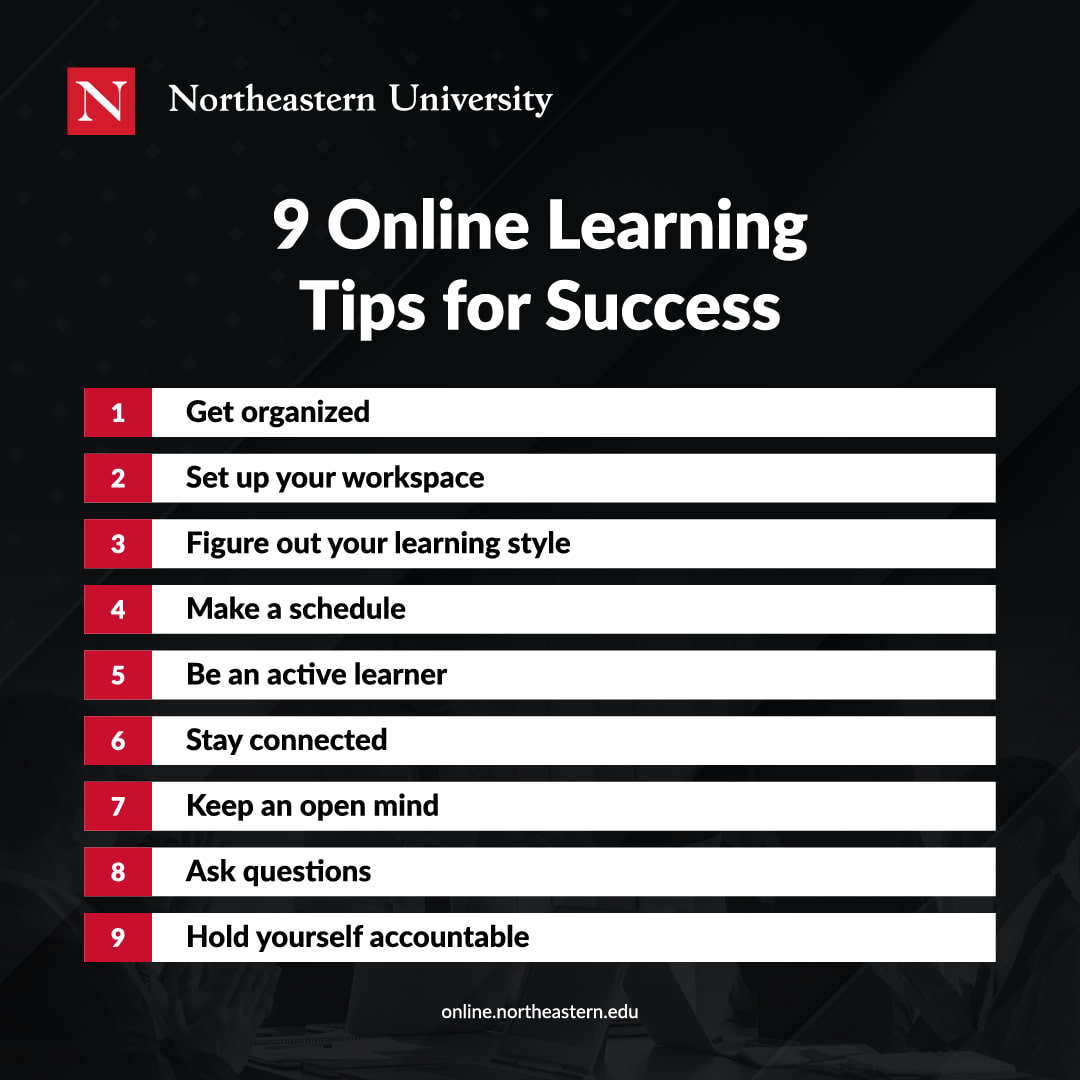Students are taking advantage of online degree programs in record numbers. In fact, the number of online learners is expected to reach 57 million by 2027 as more individuals consider an online format to advance their careers, change jobs, or fulfill personal goals.
It should come as no surprise that enrollment numbers are growing, as online degree programs offer many unique benefits to learners, including a high degree of flexibility. Online courses bring immense benefits to your daily life, allowing you to learn whenever, wherever, and however works best for you—making it easier to earn a degree while balancing work and family commitments. And without having to attend classes in person, online learning gives you access to top degree programs across the country that might have otherwise been inaccessible or highly inconvenient.
Are Online Classes Easier?
It’s a misconception that online degrees are easier than their on-campus counterparts. An online program demands the same focus and motivation as is required in a traditional classroom setting. Factor in additional distractions that online students encounter—such as children in the home while taking classes—and the workload can easily feel more challenging.
Online courses present challenges if you’re not prepared. But, if you develop skills for effective online learning, you’ll find the courses can be an excellent alternative to a traditional classroom setting. Here are some tips for online learning success to make sure you get the most value out of your next class.
What Makes an Online Student Successful?
To be a successful online student, it is critical for you to practice self-motivation tactics, effective time management, and strong communication skills. In addition, the time commitment for online classes requires well-developed productive study habits and an adaptability to learn both in a virtual classroom setting as well as on your own outside of instruction. While these competencies might seem difficult at first, becoming goal-oriented can help you develop the motivation needed to hold yourself accountable on a regular basis.
9 Online Learning Strategies for Success

1. Get Organized
Before the semester begins, ensure you have the technical capability to access the required course materials, including e-books, online tools, and course websites. Take the time to practice navigating the online system so you’ll be prepared for your first class. This way you can focus on learning instead of struggling to log in five minutes into the lecture. Also, just as you would in a physical classroom, make sure you have materials on hand to take reliable notes. Keeping a record of your work throughout the semester will come in handy during final exams.
2. Set Up Your Workspace
Set up a dedicated learning environment for studying. By completing your work there repeatedly, you’ll begin to establish a routine. Not all students are alike—some work best listening to music, while others need peace and quiet. Experiment to discover which type of setting boosts your productivity. Whether your workspace is your kitchen table or the corner booth in a local coffee shop, just make sure you have a strong internet connection to access your coursework.
When choosing a workspace, try to limit distractions as much as possible, both physically and online. If you’re at home, resist the urge to turn on the television or finish that last load of laundry. Online, use apps like Freedom or ColdTurkey to limit interruptions and block social media sites that might compete for your attention during lectures.
3. Figure Out How You Learn Best
Once you’ve established where you’ll learn, think about when and how you accomplish your best work. If you’re a morning person, make time to study first thing. More of a night owl? Set aside an hour or two after dinner to cozy up to your computer. If the kids require your morning and evening attention, try to carve out a study session mid-day while they’re at school. Brew your usual cup of coffee, put on your go-to playlist, and do whatever you need to get into the zone and down to business.
Not everyone learns the same way, so think about what types of information help you best grasp new concepts and employ relevant study strategies. If you’re a visual learner, for example, print out transcripts of the video lectures to review. Learn best by listening? Make sure to build time into your schedule to play and replay all audio- and video-based course content.
4. Make A Schedule
Without a professor regularly checking in, it’s important to leverage your time management skills. Glance over the syllabus before your first day of class and make note of major assignments. Mark them on a calendar you check regularly so you know what workload is coming in the weeks ahead. Don’t forget to factor in prior commitments that may interfere with your regular study schedule, such as weddings or vacations, so you can give yourself enough extra time to complete assignments.
Commit to making your online coursework part of your weekly routine. Break up your workload into chunks by dedicating certain hours each week to reading, watching lectures, writing assignments, studying, and participating in forums. Then, set reminders for yourself to complete the tasks. Treat these blocks of time as seriously as you would a face-to-face lesson by showing up, letting others know you are unavailable during those times, and consistently using your designated workspace. Set a timer and give yourself permission to move on to other tasks once the time is up.
5. Be an Active Participant
Take initiative by reading materials, reaching out to classmates and instructors, and conducting additional research as needed. Productive online learners focus on acquiring and utilizing feedback for future coursework. Students who take time to engage with their instructors and classmates also tend to have the most success in their classes.
6. Stay Connected
Just because you aren’t physically in the same location, doesn’t mean you can’t get to know your fellow classmates. Build relationships with other students by introducing yourself and engaging in online discussion boards. Make an effort to ask and answer questions to enhance your understanding of the course material and build a bond with other students. Your peers can be a valuable resource when preparing for exams or asking for feedback on assignments. Make connections with the other students in your online classroom and you’ll have a built-in study group at your fingertips.
Don’t be afraid to reach out to your instructor to introduce yourself or ask questions, either. They are eager to engage one-on-one with their students, whether online or in person. And, if you do fall behind, speak up. Don’t wait until an assignment is almost due to ask questions or report issues. Email your professor and be proactive in asking for help.
7. Have an Open Mind
Some online learners feel more comfortable sharing their thoughts and opinions virtually than in the classroom. Online learning provides students with the time they need to actively reflect and organize their thoughts before answering a question or making a comment. Having an open mind helps students interact with the material—and fosters a more engaged and open community.
8. Ask Questions
The best online learners don’t hesitate to ask questions. They aren’t afraid to request clarification or guidance from other students and instructors. By doing this, they avoid confusion, become more engaged with the content, broaden their knowledge, and deepen relationships with their classmates. Successful students will also take advantage of posting to a group forum to ask questions other students may have. Professors encourage this type of interaction and value the community it builds.
9. Hold Yourself Accountable
Set goals at the beginning of the semester and check in with yourself weekly. In a traditional classroom setting, you’ll often receive verbal or visual reminders of an assignment’s upcoming due date. But without a professor actively reminding you, it’s up to you to make sure you’ve allotted enough time to complete the work so you’re not starting an assignment the day before it’s due. If you’re having trouble holding yourself responsible, pair up with a fellow classmate, or enlist the help of a spouse or friend to check in as an accountability partner. By being organized, proactive, and self-aware, you can get the most from your online class even when life outside of school becomes chaotic.
Setting Yourself Up For Success
Earning an online degree is a great opportunity to impress future employers and advance your career in a way that works for you. Adjusting to the nuances of distance learning, however, can take some getting used to. Use the nine tips and strategies above to become a successful online learner and take your skills to the next level.
Are you interested in earning your bachelor’s degree virtually? Explore Northeastern’s online bachelor’s degree completion programs.
